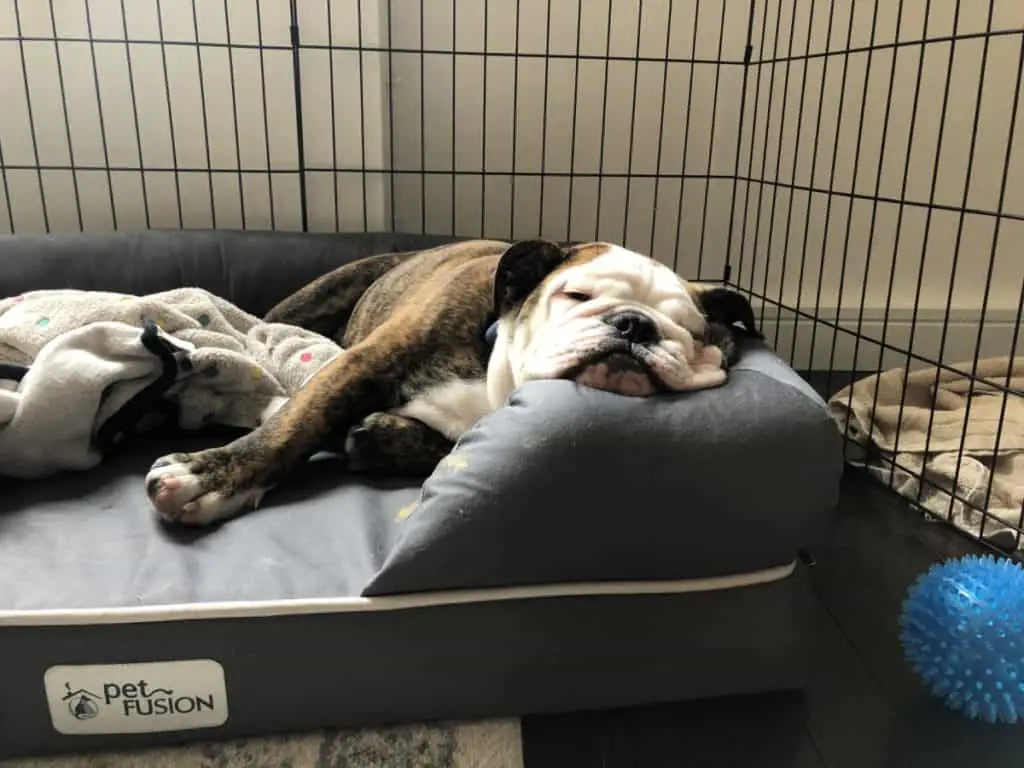Without a doubt, English bulldogs are one of the most adorable pets, stealing the show with their cuddly bodies and friendly behavior. However, they often suffer from the problem of vomiting or throwing up.
English bulldogs are susceptible to throwing up and nausea for two reasons. The structure of the bulldog’s mouth makes it difficult for them to chew their food completely. Bulldogs also have an elongated pallet that makes breathing more difficult which can lead to ingesting excess air when they eat.
Do you have an English bulldog that throws up often? Here’s all you need to know about why your lovely pet faces this unpleasant health condition and how to prevent it from happening frequently.

Are English bulldogs more likely to throw up compared to other breeds?
The shape of their noses makes English bulldogs quite unique. They are a brachycephalic breed, i.e. their nose is compressed from the back to the front. This nose structure is also responsible for causing some troubles in ingesting food. An elongated pallet that’s never fully formed is another reason they have difficulty in breathing. These are two reasons why English bulldogs are more susceptible to nausea and throwing up, and make them throw up more often than other breeds.
What causes English bulldogs to throw up?
Apart from the shape of their nose, there are several other factors that make bulldogs throw up. Below are some of the chief reasons that are responsible for frequent vomiting.
Stomach problems
The most common reason that English bulldogs throw up frequently is their sensitive stomachs. They can easily suffer from gastronomical problems and bloating, which in turn leads to vomiting. Several other food problems or allergies, and consuming rotten or infected food, not only lead to severe infections in bulldogs but also makes them throw up. Sudden diet changes further result in a bloated stomach, thereby making your little four-legged friend go into a vomiting spree or even diarrhea.
To identify whether your pup is suffering from some kind of stomach problem, look for signs like watery eyes, bloody nails, dull fur, itchiness, or ear infections. Next, get the problem diagnosed and treated immediately by taking the pup to a vet.
Eating too fast
It’s important for English bulldogs to eat slowly due to the structure of their nose. Eating too fast makes them inhale air along with the food, leading to vomiting or regurgitating. Regurgitating means throwing up food that isn’t even digested yet and comes straight out of the dog’s esophagus. The food that comes out in regurgitating is mostly covered in lots of saliva and mucus.
On the other hand, vomiting expels already digested food right from the stomach. In such a case, you will witness a movement in your pet’s abdominal muscles before emptying the contents of their stomach. Drinking water too fast or having unwanted moisture in the system also makes them vomit. If the eating speed is not reduced, vomiting can become a regular ritual in bulldogs.
Eating or swallowing foreign substances
If puppies eat something that’s not edible or have certain food items that aren’t meant for them, they will surely throw up. English bulldogs may sometimes eat some random stuff around the house. Many pets often ingest the padding and stuffing from chewing apart stuffed soft toys, which can lead to vomiting.
An empty stomach
Some English Bulldogs often vomit in the morning when they haven’t eaten anything. Sleeping on an empty stomach is the cause of throwing up, and the vomit in such cases usually consists of yellowish bile. Your pet will show specific symptoms like lip smacking, or behaving very sensitive to a basic touch on the abdomen, or eating dirt. Usually sleeping on an empty stomach leads to over-stimulation of the spleen and pancreas, thereby leading to indigestion, burning sensation in the stomach, burping, and eventually, vomiting. You can prevent this by offering them a bedtime snack.
Indulging in physical activity too soon after eating
The super sensitive stomach of your bulldog can get upset by things as little as playing too soon after eating. Allow your bulldog to relax for at least 20 minutes after a meal, before doing anything physically arduous or energetic.
Inflammation in the gut
Sometimes dogs vomit due to inflammation in their gut. This is an indication of a depleted microbiome, where they suffer from food sensitivity and trouble in the intestines. In that condition, vomiting occurs several times over a 24-hour period because of the gastrointestinal inflammation. You can easily identify the problem very soon as the vomit will usually be brown or yellow in color while being semi-transparent and watery.
Motion sickness
Car sickness is seen more often in young dogs as compared to the adults because the ear structures of pups aren’t completely developed. It’s exactly the same as when little children are more prone to vomiting in the car than adults. However, some bulldogs remain vulnerable to vomiting when traveling, even after their ears mature.
6 tips for reducing vomiting in English bulldogs
Identifying the problem and the underlying cause of vomiting allows you to take the appropriate measures to relieve your dog. Here’s what you can do to prevent your bulldog from throwing up.
Make them eat in a calm environment
Making your dog eat in a calm environment will help them slow down eating. Eating alone will help as this won’t let them feel any sense of competing for food. The more slowly they eat their food, the more likely you can prevent sickness or regurgitation. In fact, make sure even the kids are not around your pet when they’re eating because making them habitual to slow eating requires complete privacy. Putting a ball in their dish works wonders to make them eat slowly by engaging their mind as well as making them work around the toy while eating. There are also several types of dog bowls for fast eaters, which have features that help slow down your dog’s food intake.
Avoid sudden changes to your bulldog’s diet
To avoid a troubled digestive system, make sure you never change your dog’s diet suddenly. Instead, go for a gradual change, especially when turning to adult food from puppy meals. It’s essential to carefully monitor every little change in your pet’s diet to make sure you find any allergies.
Avoid feeding for some time if your bulldog has a stomach infection
If your English bulldog vomits due to a stomach problem, contact a vet. They may recommend withholding food from them for a few hours, but not more than a day. They will get relief when there’s no food to expel, and all they should have during those hours is small amounts of water. To keep them hydrated, you can also offer an ice cube to lick to allow a soothing action for their digestive tract.
How to prevent motion sickness
You can always prevent your pup from throwing up by using a specially crafted dog seat belt. About half an hour before you head for the trip, give some powdered ginger to the pup that will calm their gut. If your dog finds it hard to ingest capsules, you can always go for some powdered ginger in a base of honey, further adding powdered chamomile that’s twice the amount of ginger.
Probiotic treatment for gut inflammation
When your bulldog suffers from inflammation in the gut and a nervous stomach, go for probiotic treatments that are easy to create at home. Plain, unsweetened yogurt is a simple probiotic that you can give to your dog. Some catnip can also help as it will calm your puppy as it balances their nervous system. Or simply infuse a little catnip with a cup of lukewarm water, giving the solution to your dog at least twice a day.
Treating vomiting caused by an empty stomach
As mentioned above, feeding them a light snack or some food before sleeping usually helps prevent them from throwing up in the morning.
Once you are aware of the different reasons for why your bulldog may be vomiting or throwing up frequently, all it takes is just a little extra care and some precautions to address this problem. However, if you have taken these measures and still see that the problem persists, you know what must be done: take your pet to your veterinarian immediately, seeking professional medical assistance for your bulldog.
